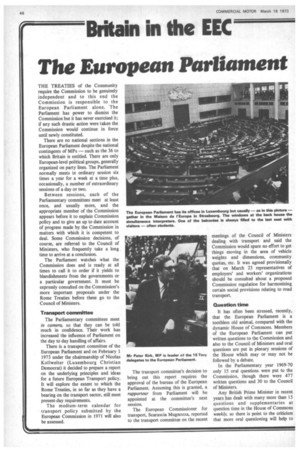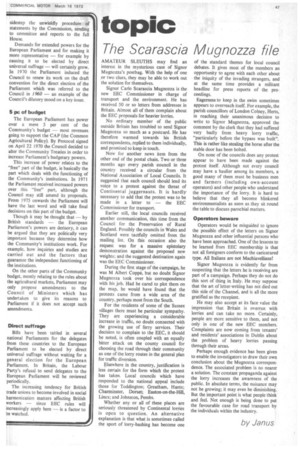Britain in the EEC
Page 48

Page 49

If you've noticed an error in this article please click here to report it so we can fix it.
The European Parliament
THE TREATIES of the Community require the Commission to be genuinely independent and to this end the Commission is responsible to the European Parliament alone. The Parliament has power to dismiss the Commission but it has never exercised it; if any such drastic action were taken the Commission would continue in force until newly constituted.
There are no national sections in the European Parliament despite the national contingents of MPs — such as the 36 to which Britain is entitled. There are only European-level political groups, generally organized on party lines. The Parliament normally meets in ordinary session six times a year for a week at a time plus, occasionally, a number of extraordinary sessions of a day or two.
Between sessions, each of the Parliamentary committees meet at least once, and usually more, and the appropriate member of the Commission appears before it to explain Commission policy and to give an up to date account of progress made by the Commission in matters with which it is competent to deal. Some Commission decisions, of course, are referred to the Council of Ministers, who frequently take a long time to arrive at a conclusion.
The Parliament watches what the Commission does and is ready at all times to call it to order if it yields to blandishments from the governments or a particular government. It must be expressly consulted on the Commission's more important proposals under the Rome Treaties before these go to the Council of Ministers.
Transport committee
The Parliamentary committees meet in camera., so that they can be told much in confidence. Their work has increased the influence of Parliament on the day to day handling of affairs.
There is a transport committee of the European Parliament and on February 1 1973 under the chairmanship of Nicolas Kollwelter (Luxembourg Christian Democrat) it decided to prepare a report on the underlying principles and ideas for a future European Transport policy. It will explore the extent to which the Rome Treaties, in so far as they have a bearing on the transport sector, still meet present-day requirements.
The medium-term calendar for transport policy submitted by the European Commission in 1971 will also be assessed.
The transport committee's decision to bring out this report requires the approval of the bureau of the European Parliament. Assuming this is granted, a rapport eur from Parliament will be appointed at the committee's next session.
The European Commissioner for transport, Scarascia Mugnozza, reported to the transport committee on the recent meetings of the Council of Ministers dealing with transport and said the Commission would spare no effort to get things moving in the area of vehicle weights and dimensions, community quotas, etc. It was agreed provisionally that on March 23 representatives of employers' and workers' organizations should be consulted about a proposed Commission regulation for harmonizing certain social provisions relating to road tran sport.
Question time It has often been stressed, recently, that the European Parliament is a toothless old animal, compared with the dynamic House of Commons. Members of the European Parliament can put written questions to the Commission and also to the Council of Ministers and oral questions are put in plenary sessions of the House which may or may not be followed by a debate.
In the Parliamentary year 1969-70 only 15 oral questions were put to the Commission, though there were 477 written questions and 30 to the Council of Ministers.
Any British Prime Minister in recent years has dealt with many more than 15 questions and supplementaries at question time in the House of Commons weekly, so there is point to the criticism that more oral questioning will help to
sidestep the unwieldly procedure of statements by the Commission, sending to committee and reports to the full House.
Demands for extended powers for the European Parliament and for making it more representative — for example by causing it to be elected by direct universal suffrage — will certainly grow. In 1970 the Parliament induced the Council to renew its work on the draft convention for the direct election of the Parliament which was referred to the Council in 1960 — an example of the Council's dilatory mood on a key issue.
5 pc of budget The European Parliament has power over a mere 5 per cent of the Community's budget — most revenues going to support the CAP (the Common Agricultural Policy). By Protocol signed on April 22 1970 the Council decided to alter the Community Treaties in order to increase Parliament's budgetary powers.
This increase of power relates to the "free" part of the budget, ie basically the part which deals with the functioning of the Community's institutions. In 1971 the Parliament received increased powers over this "free" part, although the Council may still amend its proposals. From 1975 onwards the Parliament will have the last word and will take final decisions on this part of the budget.
Though it may be thought that — by British standards — the European Parliament's powers are derisory, it can be argued that they are politically very important because they determine how the Community's institutions work. For example, how inquiries and studies are carried out and the factors that guarantee the independent functioning of the institutions.
On the other parts of the Community budget, mostly relating to the rules about the agricultural markets, Parliament may only propose amendments to the Council of Ministers which has undertaken to give its reasons to Parliament if it does not accept such amendments, Direct suffrage Bills have been tabled in several national Parliaments for the delegates from these countries to the European Parliament to be elected by direct universal suffrage without waiting for a general election for the European Parliament. In Britain, the Labour Party's refusal to send delegates to the European Parliament will be reviewed periodically.
The increasing tendency for British trade unions to become involved in social harmonization matters affecting British workers — since E,EC rules ---------increasingly apply here — is a factor to be watched.
























































































































